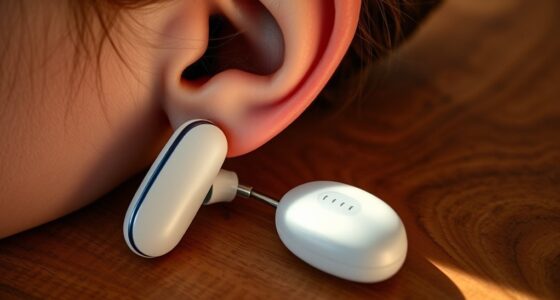Cognitive behavioral therapy (CBT) for chronic ringing helps you manage your emotional reactions and change negative thought patterns about tinnitus. It guides you through recognizing how your thoughts influence your feelings, challenging unhelpful beliefs, and developing effective coping strategies like relaxation techniques and gradual exposure. By creating a personalized plan, you can reduce anxiety and increase resilience. To learn the step-by-step process, you’ll discover practical tips and guidance to build a better day-to-day approach.
Key Takeaways
- Identify negative thoughts and beliefs about tinnitus to challenge and reframe them effectively.
- Develop personalized coping strategies, including mindfulness and relaxation techniques, to reduce emotional distress.
- Use behavioral experiments to gradually confront tinnitus triggers and desensitize emotional responses.
- Track emotional and behavioral patterns to recognize and modify reactions that worsen tinnitus perception.
- Create a structured plan incorporating sound therapy, lifestyle adjustments, and scheduled relaxation to manage symptoms proactively.
Understanding the Basics of Tinnitus and Its Impact

Tinnitus is a condition characterized by the perception of ringing, buzzing, or other phantom sounds in the ears or head, even when no external noise is present. It can profoundly impact your daily life, causing stress, difficulty concentrating, and sleep problems. Understanding how tinnitus affects you is essential for managing it effectively. Sound therapy offers a way to mask or reduce the perceived noise, providing relief during stressful moments. Additionally, medication options may help alleviate associated symptoms like anxiety or sleep disturbances, but they don’t cure tinnitus itself. Recognizing how these treatments work helps you make informed choices and sets the foundation for exploring other management strategies, such as cognitive behavioral therapy, to improve your quality of life. Incorporating essential oils for relaxation might also support stress reduction and overall well-being during your tinnitus management journey.
The Role of Cognitive Behavioral Therapy in Managing Tinnitus

Cognitive Behavioral Therapy helps you change negative thought patterns that worsen your perception of tinnitus. It also works to reduce your anxiety levels, making the ringing feel less overwhelming. Additionally, therapy can help you build tolerance to sounds, making daily life more manageable. Incorporating techniques like Pimple Patch usage strategies can enhance your coping skills and support overall treatment effectiveness.
Changing Thought Patterns
Since your thoughts can substantially influence how you perceive and react to ringing in your ears, changing negative thought patterns is an essential part of managing tinnitus. You can do this by practicing mindfulness techniques that help you observe your thoughts without judgment, reducing their emotional impact. Focus on replacing negative beliefs, like “This ringing will never stop,” with more neutral or positive thoughts. Improving your sleep hygiene also plays a critical role, as better sleep can help you maintain a balanced perspective and prevent negative thinking from intensifying. Challenging distorted thoughts and cultivating awareness through mindfulness can gradually shift your mindset, making tinnitus seem less overwhelming. Incorporating mindfulness practices can further enhance your ability to manage emotional responses and foster a sense of calm. Over time, this change in thought patterns will help lessen the emotional distress associated with your ringing ears.
Reducing Anxiety Levels
Reducing anxiety levels is a crucial aspect of managing tinnitus effectively, and cognitive behavioral therapy (CBT) offers practical strategies to achieve this. By addressing your anxious thoughts, CBT helps lessen the emotional impact of tinnitus, making it feel less overwhelming. Incorporating sound therapy can also help reduce anxiety by masking the ringing and creating a calming environment. Additionally, medication options may be recommended to manage severe anxiety symptoms, complementing CBT efforts. Focused relaxation techniques and mindfulness exercises further lower stress levels, helping you regain control. A thorough understanding of Gold IRA Rollovers can also provide additional financial security and peace of mind in long-term planning. Remember, managing anxiety is a gradual process, but with consistent effort and the right tools, you can decrease the emotional distress caused by tinnitus, improving your overall quality of life.
Enhancing Sound Tolerance
Have you ever felt overwhelmed by the persistent sound of tinnitus, making it difficult to focus or relax? Enhancing sound tolerance is key to managing this. Cognitive behavioral therapy helps reframe your response to the noise, but sound therapy plays a crucial role too. Imagine:
- Listening to soft, calming sounds that gradually mask the ringing.
- Using background noise to reduce sensitivity during daily activities.
- Incorporating specialized sound devices designed for tinnitus relief.
- Exploring medication options that may dampen the brain’s reaction to tinnitus signals.
- Understanding the importance of best anime movies and how engaging in enjoyable entertainment can distract from tinnitus symptoms.
These strategies, combined with CBT, can help desensitize your auditory system, making the ringing less intrusive. By actively engaging with sound therapy and appropriate medication options, you regain control over your environment and improve sound tolerance.
Building Awareness: Recognizing Your Thoughts and Reactions

You begin by noticing negative thoughts that pop up about your tinnitus, understanding how they influence your feelings. Pay attention to your emotional responses and how they shift throughout the day. Recognizing patterns in your reactions helps you gain control and develop healthier ways to cope.
Identifying Negative Thoughts
Understanding your thoughts and reactions is a crucial first step in managing chronic ringing through cognitive behavioral therapy. To identify negative thoughts, start by observing how your mind reacts during ringing episodes. Visualize these thoughts as:
- Jumping to worst-case scenarios about your health.
- Believing the ringing will never improve.
- Blaming yourself for the ongoing noise.
- Focusing only on the discomfort, ignoring positive moments.
Practicing mindfulness meditation helps you notice these thoughts without judgment. Additionally, dietary modifications can reduce inflammation that worsens your perception of ringing. As you build awareness, you’ll recognize patterns of negative thinking, making it easier to challenge and reframe them. This active recognition creates a foundation for more effective coping strategies. Recognizing the Horsepower of electric dirt bikes can also help you understand how different factors influence your perception and management of tinnitus.
Monitoring Emotional Responses
Recognizing your emotional responses during ringing episodes helps you gain a clearer picture of how your feelings influence your perception of the noise. Developing emotional awareness allows you to identify which emotions arise in response to your tinnitus, such as frustration, anxiety, or anger. Practice reaction tracking by noting when these feelings occur and how intense they feel. This process helps you understand patterns in your emotional responses and their connection to your reactions. By observing without judgment, you can begin to see how certain emotions amplify your distress. Regularly monitoring your emotional responses creates a foundation for managing your reactions more effectively, ultimately reducing the emotional impact of ringing and helping you regain a sense of control over your experience. Understanding the contrast ratio of your environment can also influence your comfort level and how you perceive the ringing.
Recognizing Behavioral Patterns
By paying close attention to your behaviors and reactions during ringing episodes, you can uncover patterns that influence your emotional response. Mindful listening helps you notice these patterns without judgment. As you observe, you might see:
- When you automatically seek silence, increasing frustration.
- How focusing on the ringing heightens anxiety.
- Your tendency to withdraw or isolate during episodes.
- How shifting your attention to breathing or a calming thought improves emotional regulation.
- Incorporating mindfulness practices can deepen your awareness and help manage emotional reactions more effectively.
Recognizing these behaviors allows you to address them intentionally. Instead of reacting impulsively, you can develop healthier responses. Building awareness of your behavioral patterns empowers you to break negative cycles and foster calmer, more balanced reactions during ringing episodes.
Challenging Negative Thought Patterns Related to Tinnitus

When you experience tinnitus, it’s common to fall into negative thought patterns that intensify your distress, such as believing the ringing will never stop or that it will ruin your life. To challenge these thoughts, start by noticing when they arise and actively questioning their accuracy. Mindfulness exercises help you observe your thoughts without judgment, making it easier to detach from negative beliefs. Sharing your experiences in peer support groups can also remind you you’re not alone and provide new perspectives. Replace catastrophic thoughts with more balanced ones, like acknowledging that tinnitus is manageable and that your reactions influence your experience. Consistently challenging negative thoughts weakens their hold, empowering you to approach tinnitus with a more constructive mindset.
Developing Coping Strategies and Relaxation Techniques

Developing effective coping strategies and relaxation techniques is essential for managing tinnitus. These tools help you regain control and reduce distress. Start by practicing mindfulness exercises that encourage present-moment awareness, helping you observe your tinnitus without judgment. Next, incorporate breathing techniques such as deep diaphragmatic breaths to calm your nervous system. Visualize these methods:
Practice mindfulness and deep breathing to manage tinnitus and reduce stress effectively.
- Sitting quietly and focusing on your breath, feeling your chest rise and fall.
- Using guided mindfulness apps to anchor your attention away from ringing sounds.
- Taking slow, deliberate inhalations and exhalations during stressful moments.
- Engaging in progressive muscle relaxation to release physical tension.
Consistent practice strengthens your resilience, making tinnitus less intrusive and easier to manage.
Gradual Exposure and Desensitization to Tinnitus Triggers

Practicing relaxation techniques and coping strategies helps you manage your reactions to tinnitus, but sometimes exposure to triggers can still provoke heightened awareness or distress. Gradual exposure and desensitization involve intentionally and slowly exposing yourself to specific tinnitus triggers in a controlled way. Incorporate mindfulness exercises to stay present and reduce anxiety during exposure, helping you observe triggers without judgment. Improving sleep hygiene is essential, as restful sleep reduces overall sensitivity to tinnitus. Start with mild triggers, like background noise, and gradually work up to more challenging situations. Over time, your reactions will diminish as you build tolerance. Consistent practice of these steps strengthens your ability to cope, making tinnitus less intrusive in your daily life. Utilizing sound therapy techniques can further facilitate desensitization by providing a controlled auditory environment during exposure.
Creating a Personalized Action Plan for Daily Management

Creating a personalized action plan for daily management empowers you to take control of your tinnitus and reduce its impact on your life. Start by establishing routines that include activities like music therapy—using calming sounds to distract your mind. Next, consider dietary adjustments, such as reducing caffeine or salty foods, to minimize triggers. You might also schedule quiet moments for relaxation or mindfulness exercises. Incorporate these steps:
Creating a daily routine with calming sounds and mindful habits helps manage tinnitus effectively.
- Designate specific times for listening to soothing music or white noise.
- Track foods that worsen your tinnitus and adjust your diet accordingly.
- Develop a daily routine that includes relaxation and stress reduction.
- Prepare a list of calming activities to use during flare-ups.
This plan keeps you proactive, helping you manage tinnitus effectively each day.
Monitoring Progress and Adjusting Strategies

To effectively manage your tinnitus, it’s essential to regularly monitor your symptoms and track your responses to different strategies. Keep a journal noting how your tinnitus changes with mindfulness exercises, relaxation techniques, or support groups. Recognizing patterns helps you identify what works best. Adjust your strategies accordingly, emphasizing techniques that reduce your perception of ringing. Checking in frequently keeps you aware of progress and highlights areas needing improvement. Incorporating newborn sleep patterns into your routine can also help manage stress and improve overall well-being.
Maintaining Long-Term Well-Being Beyond Therapy

Maintaining long-term well-being beyond therapy requires ongoing self-care and awareness. To stay resilient, incorporate practices like:
- Engaging in daily mindfulness exercises to center your mind and reduce stress.
- Connecting with peer support groups to share experiences and gain encouragement.
- Setting aside time for regular relaxation techniques to prevent overwhelm.
- Tracking your progress, so you recognize improvements and identify areas needing attention.
These habits reinforce your coping skills and help you stay grounded. Consistent mindfulness exercises can make ringing less intrusive, while peer support provides understanding and motivation. By actively maintaining these routines, you strengthen your mental resilience, ensuring that the progress you’ve made endures well beyond therapy sessions.
Frequently Asked Questions
Can CBT Cure Tinnitus Permanently?
You might wonder if CBT can cure tinnitus permanently. While it doesn’t eliminate the sound, CBT helps you manage your reactions through sound therapy and stress reduction techniques. By changing how you perceive and respond to the ringing, you can reduce its impact on your life. Although it may not provide a permanent cure, CBT markedly improves quality of life and helps you regain control over your symptoms.
How Long Does It Take to See Results With CBT?
You might think you’ll notice a miracle overnight, but with CBT for tinnitus, patience is key. Usually, you’ll start seeing improvements within a few weeks, but full benefits often take a few months. The timeline expectations vary based on individual therapy duration and commitment. Don’t expect instant silence—think of it more as tuning a radio slowly until the static fades, revealing clearer sound over time.
Is CBT Effective for All Tinnitus Types?
You might wonder if CBT works for all tinnitus types. It’s generally effective, but individual responses vary because of tinnitus variability. Some people notice significant relief, while others see gradual improvements. Factors like the severity and causes influence outcomes. While CBT can help manage symptoms across different tinnitus types, your unique situation determines how well it works. Patience and consistent therapy are key to achieving the best results.
Are There Any Risks or Side Effects of CBT?
You might wonder about potential risks or side effects of CBT. While generally safe, some people experience frustration or emotional discomfort during therapy. However, these are usually temporary and manageable with open communication and support. Side effect management involves working closely with your therapist to address concerns early, ensuring you feel safe and supported throughout your treatment. Overall, CBT’s benefits often outweigh any minimal risks involved.
How Does CBT Compare to Medication for Tinnitus Management?
Imagine you’re in a vintage arcade, choosing between a flashy pinball machine and a classic joystick—both aim to entertain, but they work differently. Similarly, CBT and medication for tinnitus management differ: CBT tackles your perceptions and reactions, while meds may reduce symptoms but can cause placebo effects or medication interactions. CBT offers a non-invasive, long-term solution without side effects, whereas medication might provide quick relief but with potential risks.
Conclusion
By following this step-by-step guide, you’ll gain control over your tinnitus, much like a knight mastering their sword. Remember, patience and persistence are key—think of it as your own quest for peace. With consistent effort, you’ll develop new coping skills and reduce the impact of ringing on your life. Stay committed, and you’ll find that even in the midst of chaos, serenity is within your grasp. Onward to a calmer mind!










